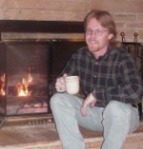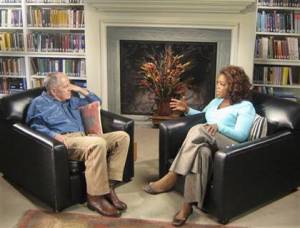Every angel is terrifying. —Rilke
You know you’re in for a special treat when Dr. John Wegner, Professor of English at Angelo State University, wryly remarks, “The last thing I want to ever imagine is Dick Cheney dancing naked claiming he will never die.” To fully appreciate the terror and humor of Wegner’s remark, you need to know a thing or two about Holden. No, not Holden Caulfield, the puling adolescent in Catcher in the Rye, but Judge Holden, the pale, burly, hairless metaphysician and mass murderer in Cormac McCarthy’s Blood Meridian. Like all characters who exist beyond good and evil, the Judge knows how to shock and awe the world. Hence, the naked dancing. Next time you’re ready to wrestle with the angel of war and violence, gaze deep into the Judge’s face. I dare you.

Dr. John Wegner
Who are you?
I ask myself that each morning. Fortunately, the answer differs day to day, and, sometimes, minute to minute. I’m a 40-year old father of a 14-year old and an 11-year old, a husband of 19 years still trying to get it right, a professor at Angelo State University, an editor of a scholarly magazine, a little league coach, a writer of scholarship and short fiction, and a lover of almost all things chocolate, among other things. Each day I remind myself that the past might define us, but we are not obligated to become slaves to it. For me, the cosmic joy in life is the ability to continually wake up each morning and decide to push that boulder up the mountain.
What’s the best book you’ve read this year?

In the Woods
This question ranks right up there with picking 10-12 novels to teach in an American novels class. Starting the list creates a flood of possibilities. I read an eclectic blend of five to six novels a  month, most recently re-reading James Lee Burke’s early Dave Robicheaux crime novels. I think I’ll cheat on this question and offer a list (that I will probably regret once I hit the send button): Tana French’s In the Woods, Denis Lehane’s Mystic River, Tom Perotta’s Little Children, Philip Kerr’s A Quiet Flame, and the Odyssey. Each of these works seems to capture a character struggling to hold on to some moral compass in the face of competing ideologies that both seem, at least on the surface, legitimate. French, Lehane, and Perotta, in particular, push our sympathies to their limits, essentially asking us to consider what happens when past histories collide. Each character is haunted by unsolved or unresolved past crimes. What is
month, most recently re-reading James Lee Burke’s early Dave Robicheaux crime novels. I think I’ll cheat on this question and offer a list (that I will probably regret once I hit the send button): Tana French’s In the Woods, Denis Lehane’s Mystic River, Tom Perotta’s Little Children, Philip Kerr’s A Quiet Flame, and the Odyssey. Each of these works seems to capture a character struggling to hold on to some moral compass in the face of competing ideologies that both seem, at least on the surface, legitimate. French, Lehane, and Perotta, in particular, push our sympathies to their limits, essentially asking us to consider what happens when past histories collide. Each character is haunted by unsolved or unresolved past crimes. What is  justice in such a situation? What is the nature of mercy and forgiveness? The Odyessy always works as a touchstone for those essential questions. In addition, all these works are well-written, intelligently
justice in such a situation? What is the nature of mercy and forgiveness? The Odyessy always works as a touchstone for those essential questions. In addition, all these works are well-written, intelligently  crafted, and unflinching in their portrayal of the world in which they exist.
crafted, and unflinching in their portrayal of the world in which they exist.
Because of your areas of interest, I’d be remiss if I didn’t squeeze you for information about Cormac McCarthy and his work. What’s your assessment of his literary status?
In an attempt to avoid hyperbole, I’ll simply say he’s one of the most creative artistic living writers in America today. Despite my comments regarding Cities of the Plain, I think we see a writer able to work within multiple genres and a writer so focused on his craft we won’t entirely appreciate him for another few years. Within his lifetime, his Blood Meridian is already considered one of the best novels written. I think we will be able to discuss at least three to four other novels as masterpieces of contemporary fiction some day. The difficulty we have with McCarthy is his larger vision and his ability to capture multiple complexities within his works.
What do you think of his stint on Oprah? Does it teach us anything about the relationship between the man and his work?
 I’m happy he felt compelled to strike while the iron was hot. I think those of us in the academy tend to look down our noses at authors who tap into popular culture as somehow inferior or less serious artistically. Nina Siegal has a fascinating new essay “The Truth About Bestsellers” recently posted on her site. She notes: “There is a very real crisis of American letters that began in the 1980s and seems to have only gotten worse in the last 25 years – and that is, the books that most Americans are buying and reading correspond very little to what we hope we’ll hand down to future generations as works of great literary merit.“ If Oprah can help bridge this gap, more power to her. Having written that, I trust the tale, not the teller. McCarthy is a fascinating, intelligent man, but I’m not sure the relationship between an author and his work is really relevant.
I’m happy he felt compelled to strike while the iron was hot. I think those of us in the academy tend to look down our noses at authors who tap into popular culture as somehow inferior or less serious artistically. Nina Siegal has a fascinating new essay “The Truth About Bestsellers” recently posted on her site. She notes: “There is a very real crisis of American letters that began in the 1980s and seems to have only gotten worse in the last 25 years – and that is, the books that most Americans are buying and reading correspond very little to what we hope we’ll hand down to future generations as works of great literary merit.“ If Oprah can help bridge this gap, more power to her. Having written that, I trust the tale, not the teller. McCarthy is a fascinating, intelligent man, but I’m not sure the relationship between an author and his work is really relevant.
Why is McCarthy’s work stained with sewage, degradation, and violence?
I love this question but I don’t know how to answer it other than the overly simplistic claim that life is filled with “sewage, degradation, and violence.” I think initial readings of his works overlook the linguistic beauty with which he constructs worlds that often feel like an assault on our intelligence and our intellect. It’s easy to accept those things that are attractive and make us comfortable; McCarthy, like the Greek tragedians, asks us (commands us?) to recognize the world’s infinite capability of both comedy and tragedy.
He is the Homer of the sewer!
—Proust, In Search of Lost Time, Vol. III: The Guermantes Way
Ahab, Humbert Humbert, Iago, Judge Holden, or Roger Chillingworth — from whom can we learn the most, and why?
Another great question. Holden is, in many respects, the compilation of these other characters. I find myself, periodically, quoting Holden as if he possesses words to live by. Then I realize what I’ve done and shake my head in wonder at myself. Holden is dangerous precisely because he seems so reasonable. Reading Holden requires a critical thinking that we should be willing to apply to any and all texts. The other characters become examples of who we don’t want to be—Holden is an example of who we might too easily become. I might add, by the way, Chigurh (No Country for Old Men) to this list. McCarthy’s characters live by a code and I think we often have in mind that evil is somehow radically different and easily recognizable. There’s no thing that flips the switch on true evil.
If you could give a novel to former Vice President Richard Bruce Cheney (“Dick,” more accurately) for his moral and spiritual improvement, what would it be? Why?
 If I had faith in his ability to understand, I would give him Blood Meridian. Unfortunately, I think he would see himself as Judge Holden and the last thing I want to ever imagine is Dick Cheney dancing naked claiming he will never die. Perhaps I would give him Moby Dick. His wife would approve (it’s a classic!) and maybe she could explain how obsession of whiteness leads to destruction.
If I had faith in his ability to understand, I would give him Blood Meridian. Unfortunately, I think he would see himself as Judge Holden and the last thing I want to ever imagine is Dick Cheney dancing naked claiming he will never die. Perhaps I would give him Moby Dick. His wife would approve (it’s a classic!) and maybe she could explain how obsession of whiteness leads to destruction.
If ever a novel had two strange, ambiguous endings, Blood Meridian is it. What do you make of the Epilogue?
Wasn’t it Patton who said that the idea wasn’t to give your life for your country, the goal was to make the other guy give his? The essential complexity of Blood Meridian is that Holden tells the American story. We might find his methods problematic, but without him America is a different country. The kid has to be abused/killed/discredited because his story might differ from the Judge’s notebook. The kid’s story might make us guilty or feel complicit in the ugly “progress” of western expansion. We willingly adopt the Judge because to deny him is to accept that the past we celebrate (Thanksgiving, Independence Day—how many times a year do we celebrate the past?) as integral to the very core of our being as a nation is flawed and must be re-examined. To do so would be to question the very notion of who we are. I think the nation’s unwillingness to fully engage with the debate regarding torture is evidence enough that we willingly avoid the seedy underbelly of life. Torture (and the Judge) is problematic because we are forced to recognize that our interest in safety might allow us to put our soul at hazard. The Judge will never die because we are all willing to enjoy our indoor plumbing and the lack of savagery beating at our doors because he helped “tame” the world. Those post hole diggers might strike rock deep in the soil, but their ability to create domestic space (fences) is because the judge has cleared the way.
On your view, what’s the most important role of the novelist?
In a lot ways, the novelist has to be a damn good liar. The novelist creates a world that resembles ours while also moving beyond it. The novelist’s goal is to capture the historical, intellectual, and culture moment all the while trying to transcend that moment. I once listened to an interview with singer/songwriter Mary Gauthier who said something like all my songs begin with me, but I hope they never end with me. When I write I try to remember this admonition. It’s not about the novelist—it’s about the larger moment. The writer should dedicate himself or herself to getting out of the way without becoming simply a reporter.



 Posted by Kevin Neilson
Posted by Kevin Neilson